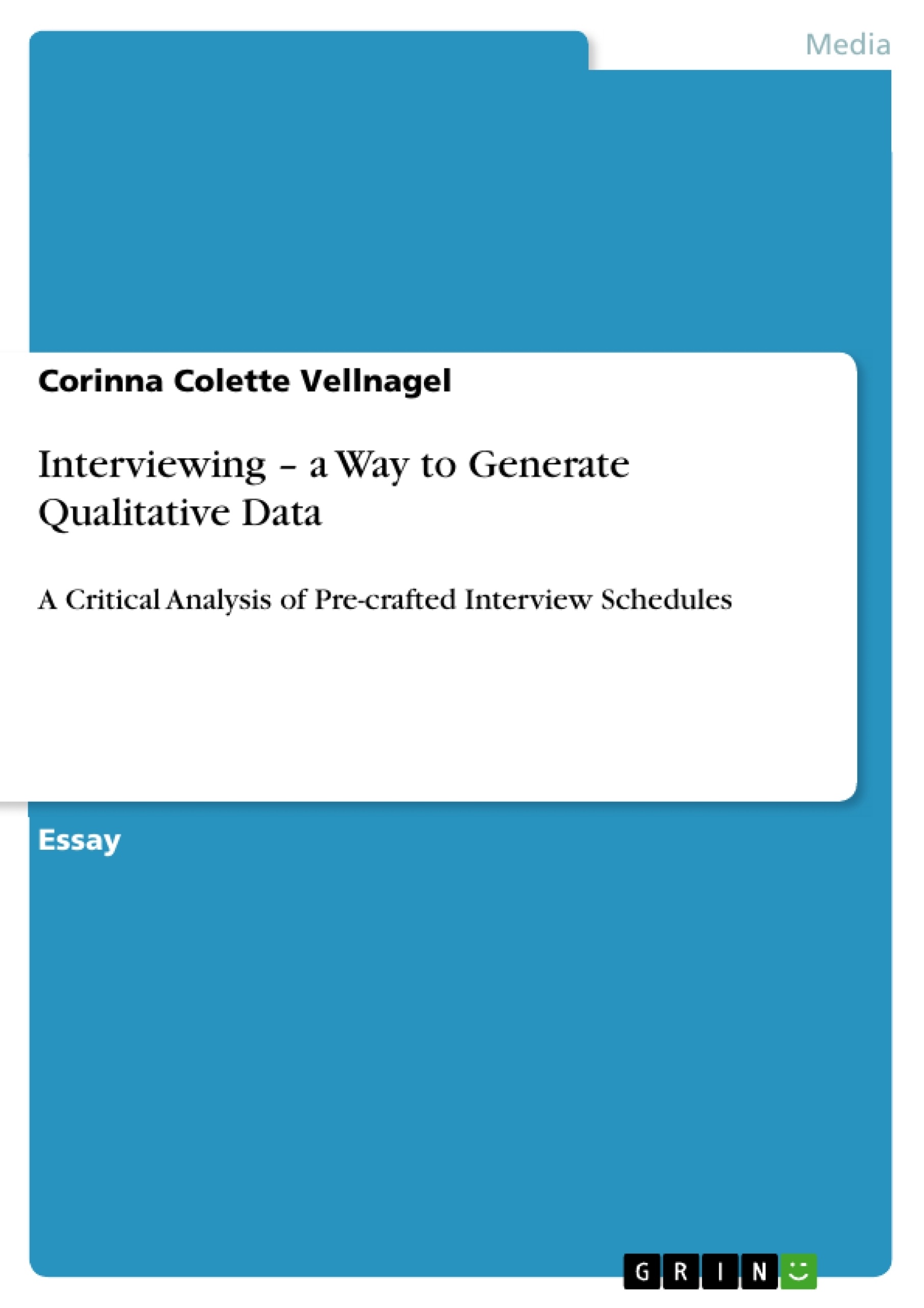Generating data can be made for all kind of purposes and in several ways (Milena et al.: 2008), whereas the main focus lies on the distinction between quantitative and qualitative research (Gerson et al.: 2002). When it comes to research most people generally think of the more common, traditional and familiar quantitative research which includes methods such as questionnaires, the creation of theories and models or the accumulation of empirical data (Holliday: 2002). This paper deals with interviewing, more precisely with interview schedules, as a method of generating qualitative data within primary market research. The structure of the work is as follows: Starting up with a the theoretical foundation with regards to interviewing, its possibilities within qualitative research and its configuration possibilities in the first part, the second part deals with the analysis of a workshop held on the topic “Generating Qualitative Data: Interviewing” within the lecture “Introduction to Research Methods” in the MA course Intercultural Communication with International Business. Within the analysis of the interview schedule problems, difficulties and limits of working with pre-crafted, semi-structured interview schedules are being identified and pointed out. Although it is not common to write a paper in another but the neutral voice a voice change into the first person takes place due to the fact that this part of the paper (3 Practical Application within the Workshop “Generating Qualitative Date: Interviewing”) delves into the personal experience and therefore requires a more personalised style. Finally, the paper concludes with a short review of the difficulties occurring when using a pre-crafted semi-structured interview schedule.
Inhaltsverzeichnis (Table of Contents)
- Introduction
- Theoretical Foundations of Interviewing
- Practical Application within the Workshop "Generating Qualitative Date: Interviewing"
Zielsetzung und Themenschwerpunkte (Objectives and Key Themes)
The paper explores the use of pre-crafted interview schedules as a method for generating qualitative data in market research, particularly within the context of a workshop on "Generating Qualitative Data: Interviewing". The analysis focuses on the practical application of these schedules, identifying potential problems, difficulties, and limitations.
- The nature and possibilities of interviewing in qualitative research
- Analysis of pre-crafted interview schedules and their effectiveness
- Challenges and limitations of using pre-crafted, semi-structured interview schedules
- The role of interviewer experience and preparation in conducting interviews
- The importance of understanding the context and motivations of interviewees
Zusammenfassung der Kapitel (Chapter Summaries)
- Introduction: This chapter introduces the paper's focus on interviewing as a method for generating qualitative data. It distinguishes between quantitative and qualitative research and emphasizes the importance of interview schedules in primary market research.
- Theoretical Foundations of Interviewing: This chapter delves into the theoretical framework of interviewing, highlighting its role in data collection across various disciplines. It explores the different types of interviews, including structured, semi-structured, and unstructured, and discusses the significance of factors like content, order, and wording in interview schedules.
- Practical Application within the Workshop "Generating Qualitative Date: Interviewing": This chapter examines the practical application of a pre-crafted, semi-structured interview schedule within a workshop focused on generating qualitative data. It analyzes the strengths and weaknesses of the schedule, highlighting the need for adaptation and improvement based on the specific context and purpose of the research.
Schlüsselwörter (Keywords)
Qualitative research, interview schedule, semi-structured interviews, primary market research, data generation, interview analysis, workshop analysis, research methods, intercultural communication, international business.
Frequently Asked Questions
What is the difference between quantitative and qualitative research?
Quantitative research focuses on questionnaires, empirical data, and models, while qualitative research, such as interviewing, explores deeper meanings and personal experiences.
What are the different types of interviews mentioned?
The research discusses structured, semi-structured, and unstructured interviews as methods for data collection.
What are the limitations of using pre-crafted interview schedules?
Pre-crafted schedules can be rigid, potentially limiting the interviewer's ability to adapt to the context or the specific motivations of the interviewee.
Why does the paper switch to a first-person perspective?
The paper uses the first person in the practical application section to better reflect personal experiences gained during a workshop on qualitative data generation.
What role does interviewer preparation play in qualitative research?
Preparation is crucial for understanding the research context and effectively managing the interview schedule to generate high-quality data.
- Quote paper
- B.A. Corinna Colette Vellnagel (Author), 2010, Interviewing – a Way to Generate Qualitative Data, Munich, GRIN Verlag, https://www.grin.com/document/167174



